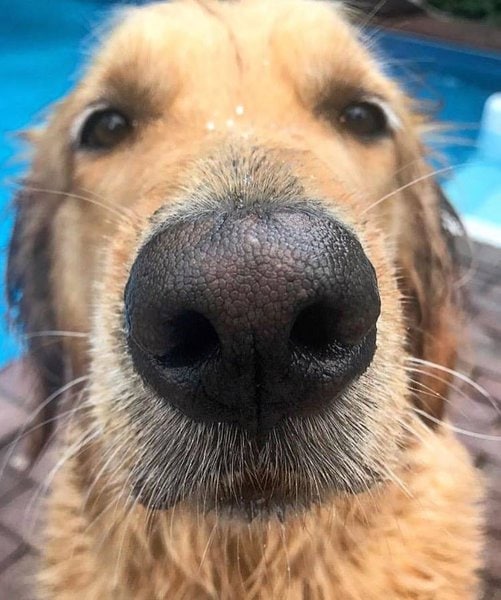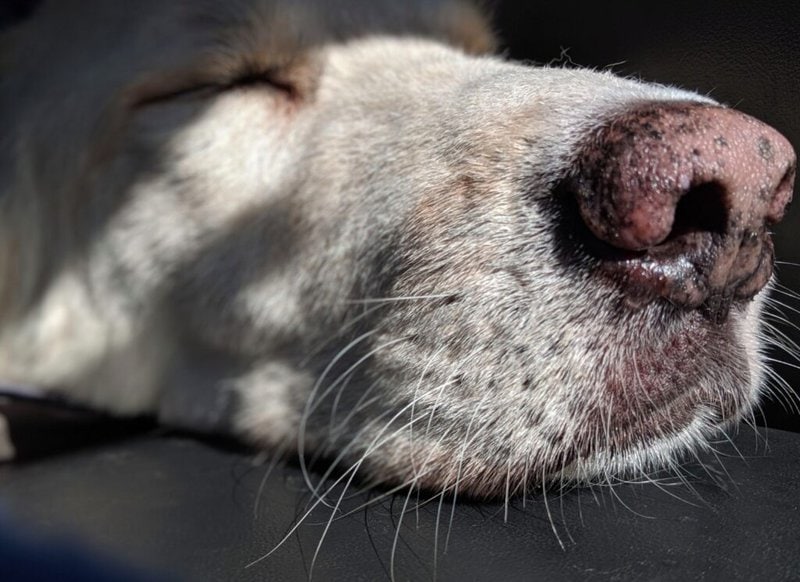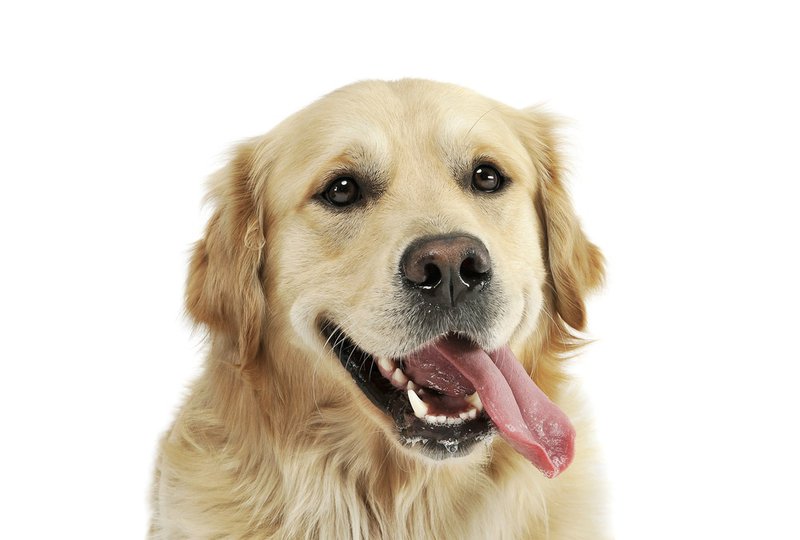You visit a friend or family member who you know has a furry friend. As you settle in for your visit, the same furry friend comes over and brushes your hand with a cold, wet nose. Your initial reaction will be to inquire if the dog is suffering from flu.
A dog’s nose is often wet because of the mucus produced in the nostrils. It keeps their noses moist and improves their sense of smell. It is important to note that there is more than one reason for the wet nose. The other main reason is that they lick their noses to stay cool and clean.
In the following sections, we will touch on the reasons why a dog’s nose is always wet, if it is a sign of good health, how to tell if your dog is unwell, and more.
How Do Dog’s Noses Get Wet?

Their noses are wet due to the mucus produced in their noses. Not only does it help to improve their sense of smell, but it also helps to keep them cool.
Another way that the nose remains moist is through licking. When a dog is eating or playing in the dirt, they tend to lick their noses so that they can stay clean and moist. Dogs also lick their noses as a reflex to keep their noses clean. They know that their sense of smell is stronger with a moist nose.
Is A Moist Nose A Sign of A Cold?
A wet nose on a dog is not a direct sign of a cold. It is mostly a sign that your dog is normal.
If you see your furry friend lick their nose or have the nose producing mucus, it means that your dog is doing all it can to boost its sense of smell.
A dog not only licks its nose to stay clean but also licks to keep cool in hot temperatures. Unlike humans who sweat to keep cool, a moist nose is how dogs keep cool.
Does a Wet Nose Mean Your Dog Is Healthy?

No, your dog can have an illness even with a damp nose. The dog can have a moist nose and still be unwell. Instead, you should look out for other symptoms to confirm their health status. For example, if the mucus is anything but a clear color, then it is a possible sign of infection. Let us now look at how to tell if your dog is unwell.
How Can I Tell My Dog Is Sick?
You can check if your dog’s appetite changes if they do not engage in normal activity or vomiting. These are just a few of the ways you can tell if your pooch is not well.
Lethargy
As a dog owner, you know how your pet acts on a typical day. Do they play? Do they jump around the house, especially when you’re around? If this changes and your pet looks tired, has low energy, and minimal movement, it might be the first sign of illness.
There are times that your dog may experience some downtime, just like us humans. But if it continues for long without any change, rush your pooch to the vet.
Loss Of Appetite
Yes, this happens to pets when they are not feeling well. If your dog does not eat for at least 24 hours, then there is a chance your pup is not well. If you notice a change in your dog’s eating habits or routine, you need to take a closer look.
Vomiting, Sneezing, Or Coughing
As we continue with this list, you will notice how alike humans and dogs are similar. A sure symptom of the illness is sneezing, coughing, or vomiting. Your dog may be experiencing kennel cough or a possible allergy. In this situation, contact your vet for medical advice.
Diarrhea
Any change to your dog’s poop is a possible sign of illness. Check if they have constipation or diarrhea that lasts for over 48 hours.
Something else you should pay attention to is if the poop has blood, mucus, or has changed in color or consistency. As you plan your visit to the vet, take a fresh stool sample for further testing with you.
Why Does My Dog Have a Runny Nose?
A runny nose is different from a moist nose and could be a sign of infection or allergies. It is especially more concerning if the mucus excreted is different in color.
There are a few reasons why your dog may experience a runny nose. It is important to pay attention so you can discuss with your vet viable treatment options.

Respiratory Issues
We touched on how a runny nose does not mean your dog has a cold. This is true for the most part, especially if the mucus is normal and clear in color.
The respiratory infection could be present if the mucus is thick and either yellow or green in color. It could be a sign of pneumonia, kennel cough, flu, and so on.
Polyps Or Tumors
There is a chance your dog has a runny nose due to tumors forming inside the nasal cavity. In many cases, they are usually small and hardly noticeable. They become a problem if they become larger in size and cause breathing problems, bleeding, and a runny nose.
Allergies
One of the things you need to do for your pup is to visit a vet and determine if they have any allergies. These can be caused by flowers, pollen, air fresheners, or oil diffusers. Just like humans, your dog will encounter a runny nose if they experience an allergic reaction.





